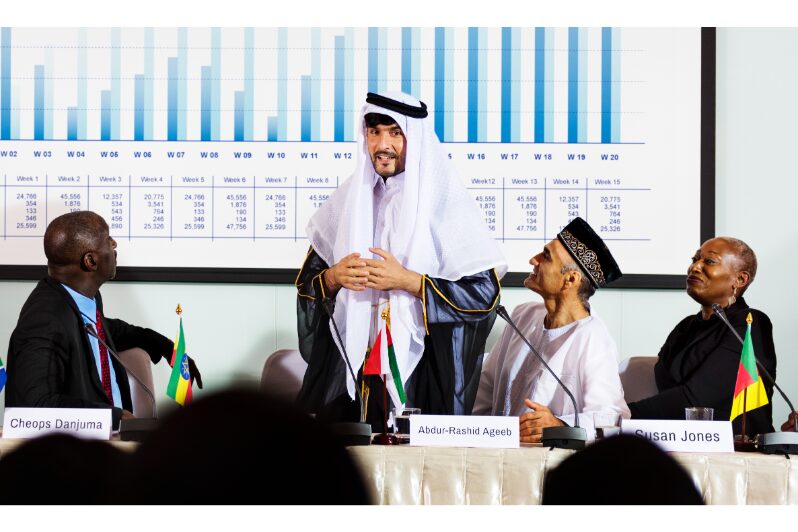The IAS1 Presentation of Financial Statements is a section of IFRS reporting. It sets out requirements for accounting services in Dubai and UAE when presenting financial statements, minimum requirements for their content, and guidelines for their structure.
Financial Statements
Accounting and financial services create financial statements for companies in Dubai and UAE to provide information regarding financial performance, financial position, and cash flows of a company that can be used to make sound decision.
- Information of changes in equity for the period
- Information of cash flows for the period
- Information of financial position as at the end of the period
- Information of comprehensive income for the period
- Notes with a summary of accounting policies and other useful information
The statement of financial position as at the beginning of the earliest comparative period is also required if some accounting policy was applied, reclassifications or restatements made retrospectively. A financial statement must be fair in presentation and also comply with IFRS, be accrual-based, include materiality and aggregation, off-set, and be consistent in presentation.
Structure and Content
According to IAS 1, Accounting services must identify and distinguish financial statements from other information in the same publication. It is mandatory for financial statements to accurately state the name of the reporting entity, whether they are for an individual or a group. And the date and period covered, the currency and the level of rounding – thousands or millions. In IAS 1, the financial statements must present the minimum content, except for the cash flow statement, based on IAS 7.
Statement of Financial Position
IAS 1 used to call this statement “balance sheet”, but renamed it after significant revisions.
It requires a separate classification of current assets and liabilities for the statement of financial position presented under IAS 1. A current asset or liability is one that will be recovered or settled within 12 months of the reporting period.
The statement of financial position shall also disclose additional sub classifications of line items, such as dividing property, plant, and equipment into classes. The statement of financial position, the statement of changes in equity and the notes also contain certain information related to the share capital, reserves, and a few others.
Statements of financial position are not prescribed by IAS 1. Instead, Dubai and UAE chartered accountants can use a variety of formats as long as they meet the above requirements.
1. Statement of Comprehensive Income
- The statement of comprehensive income features two basic components:
Profit or loss for the period
- Accounting services in Dubai must recognize all elements of expenses and income.
These are items recorded directly to reserves or equity, such as surplus, changes in revaluation, gains or losses from measurement of available for sale financial assets. By default, the statement of comprehensive income should have the following elements:
Revenue
- Gains and losses for recording of financial assets at amortized cost.
Finance Costs
- Accounting of profit or loss and joint ventures accounted for leveraging the equity method.
Tax Expense
- Profit or loss of assets or operations based on IFRS 5.
2. Other Comprehensive Income
Each element of other comprehensive income prescribed by nature.
3. Total Comprehensive Income
IAS 1 does not allow reporting items or transactions as extraordinary items. Accounting services in Dubai should present both profit or loss for the period and also total comprehensive income in allocation:
- Attributable to owners of the parent.
- Attributable to non-controlling interests.
Depending on the nature of the expense, or its function, it could be classified in profit or loss for the period. A certain amount must be disclosed separately in the comprehensive income statement or in the notes, according to IAS 1. Items include write-downs of inventories and property, plant, and equipment, reversals of those write-downs, restructuring of activities, dispositions of assets and investments, discontinuation of operations, litigation settlements, and other reversals of provisions.
Read also: ASC 842 Disclosure Requirements: How Dubai Accounting Services Can Avoid Pitfalls
Statement of Changes in Equity
In an equity statement, the following items must be included at a minimum:
- An overview of the period’s comprehensive income as attributed separately to owner interests and non-controlling interests
- Applying or restating equity components retrospectively (if applicable)
- Comparing the starting and ending carrying amounts of each period
Component of Equity
These changes shall be described separately here:
- Profits or losses resulting from business operations
- Compensated income from other sources
Contributions, distributions, and ownership changes resulting from transactions with owners
Furthermore, IAS 1 requires that dividends recognized as distributions are shown on the face of the balance sheet or in notes together with the amount per share.
Notes to the Financial Statements
A financial statement note is a document accompanying a numerical statement. Those responsible for the financial statements should disclose additional information that is not contained in the numbers, explain how the financial statements were prepared, and provide other relevant details.
The IFRS stipulates that the notes must include a statement of compliance with IFRS, a summary of significant accounting policies adopted, and an explanation of numbers presented in the financial statements.
For professional assistance with financial statements schedule appointment with chartered accountants from Farahat & Co in Dubai.
Read also: IFRS 11 Joint Arrangements for Accounting Services in Dubai

